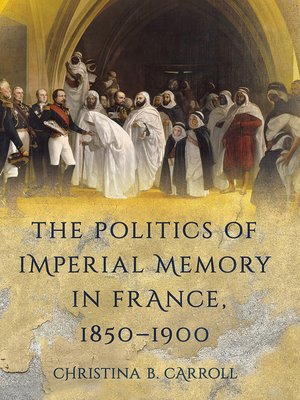
Sign up to save your library
With an OverDrive account, you can save your favorite libraries for at-a-glance information about availability. Find out more about OverDrive accounts.
Find this title in Libby, the library reading app by OverDrive.



Search for a digital library with this title
Title found at these libraries:
| Library Name | Distance |
|---|---|
| Loading... |
By highlighting the connections between domestic political struggles and overseas imperial structures, The Politics of Imperial Memory in France, 1850–1900 explains how and why French Republicans embraced colonial conquest as a central part of their political platform. Christina B. Carroll explores the meaning and value of empire in late-nineteenth-century France, arguing that ongoing disputes about the French state's political organization intersected with racialized beliefs about European superiority over colonial others in French imperial thought.
For much of this period, French writers and politicians did not always differentiate between continental and colonial empire. By employing a range of sources—from newspapers and pamphlets to textbooks and novels—Carroll demonstrates that the memory of older continental imperial models shaped French understandings of, and justifications for, their new colonial empire. She shows that the slow identification of the two types of empire emerged due to a politicized campaign led by colonial advocates who sought to defend overseas expansion against their opponents. This new model of colonial empire was shaped by a complicated set of influences, including political conflict, the legacy of both Napoleons, international competition, racial science, and French experiences in the colonies.
The Politics of Imperial Memory in France, 1850–1900 skillfully weaves together knowledge from its wide-ranging source base to articulate how the meaning and history of empire became deeply intertwined with the meaning and history of the French nation.







